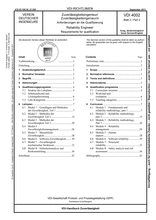Standards Worldwide
Standards Worldwide
Phone +49 30 58885700-07

Technical rule [CURRENT]
VDI 4002 Blatt 2:2011-09
Reliability Engineer - Requirements for qualification
- German title
- Zuverlässigkeitsingenieur/Zuverlässigkeitsingenieurin - Anforderungen an die Qualifizierung
- Publication date
- 2011-09
- Original language
- German, English
- Pages
- 42
- Publication date
- 2011-09
- Original language
- German, English
- Pages
- 42
Product information on this site:
Quick delivery via download or delivery service
Buy securely with a credit card or pay upon receipt of invoice
All transactions are encrypted
Short description
The document defines the requirements for the corresponding qualification and thus supplements the job description provided in VDI 4002 Part 1. The guideline has been formulated in conformity with the European Credit Transfer and Accumulation System (ECTS) and includes eight modules. The first three modules (in each case 2 credits) cover the fundamentals of reliability engineering as well as the nine most important methods and thus permit a structured entry into this complex subject. Module 4 (1 credit, as also all subsequent modules) describes the planning and control of reliability tasks as well as covering the representation of reliability work both within and outside an organisation. The teaching objective of Module 5 is to impart basic knowledge about types of human error, their dependence and effect on technical systems. In addition, well-founded methods of analysing errors of this kind are covered as well as forecasting them, estimating their probability and implementing measures combating them. Knowledge of software reliability is imparted in Module 6. It presents methods and procedures for specifying the necessary reliability, obtaining the required reliability and checking the reliability achieved and also making a reliability assessment based on this. Module 7 covers the fundamentals of the reliability of mechanical structures. In addition to dealing with different quantitative methods, the module imparts knowledge of structural reliability and partial safety concepts. Module 8 describes the fundamentals of safety engineering and provides an introduction to methods of safety analysis and to assessing system risk.
Content
ICS
03.100.30,
21.020
Also available in
Loading recommended items...
Loading recommended items...
Loading recommended items...
Loading recommended items...
